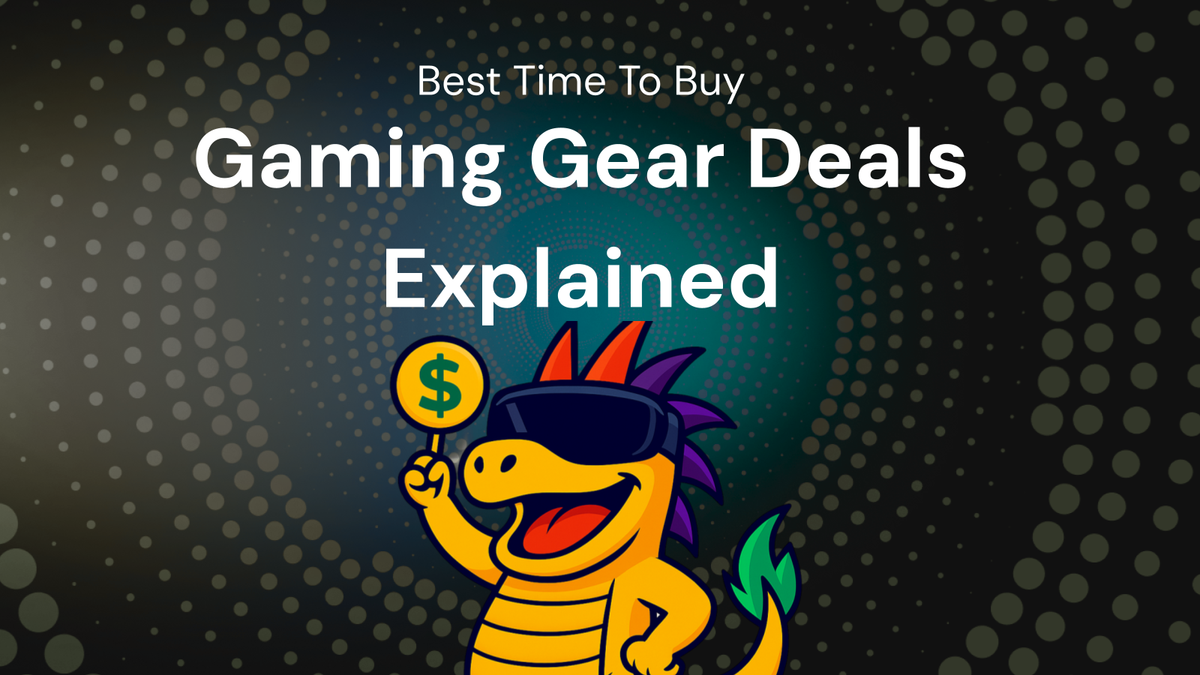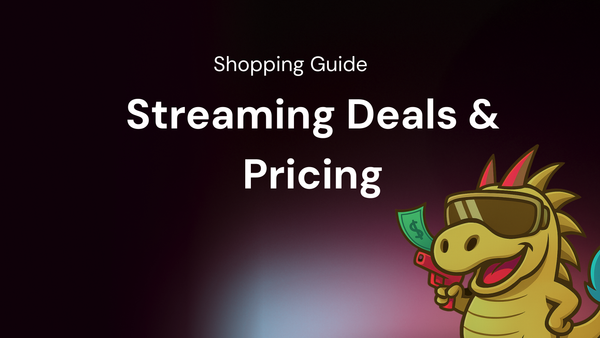gaming gear Deals Explained – Best Time To Buy + deal Guide

Gaming Gear Deals Explained – Best Time to Buy + Deal Guide
For gamers, the pursuit of the ultimate gaming experience is a constant quest. And a crucial part of that quest involves acquiring the right gaming gear. From high-performance PCs and blazing-fast monitors to comfortable headsets and responsive peripherals, the right equipment can significantly elevate your gameplay. But quality gaming gear often comes with a hefty price tag. That’s where the art of finding deals comes in.
This guide isn't about pushing specific products or services. It’s about empowering you, the gamer, with the knowledge you need to navigate the often-confusing world of gaming gear deals. We'll explore the best times to buy, different types of deals, and how to identify a genuinely good offer. Think of this as your comprehensive handbook to saving money and maximizing your gaming setup.
Why Understanding Gaming Gear Deals Matters
Before diving into the specifics, let’s underscore why understanding gaming gear deals is so important.
- Cost Savings: The most obvious benefit is saving money. Gaming PCs, monitors, and peripherals can be expensive. Finding deals allows you to acquire the gear you need without breaking the bank.
- Upgrading Opportunities: Deals can make upgrading your current setup more accessible. Maybe you've been eyeing a new graphics card or a faster SSD. A well-timed deal can make that upgrade a reality.
- Exploring New Technologies: Discounted prices can be a great way to explore new technologies. Perhaps you're curious about a mechanical keyboard or a high-refresh-rate monitor. A deal can be the perfect incentive to try something new.
- Building a Complete Setup: If you're starting from scratch, deals can help you build a complete gaming setup on a budget. This is especially important for new gamers or those transitioning from console to PC gaming.
- Avoiding Overspending: Understanding deals helps you avoid impulsive purchases and paying full price when you don't have to. It allows you to make informed decisions and get the best value for your money.
Best Times to Buy Gaming Gear: Hitting the Sweet Spots
Timing is everything when it comes to finding the best deals. Knowing when retailers are most likely to offer discounts can significantly increase your chances of scoring big savings. Here are some key periods to keep in mind:
1. Black Friday & Cyber Monday (Late November)
- Overview: These are the undisputed champions of deal-hunting. Following Thanksgiving, Black Friday and Cyber Monday offer widespread discounts across virtually every product category, including gaming gear.
- Expectations: Expect significant discounts on a wide range of products, from pre-built gaming PCs and components to peripherals and gaming accessories.
- Caveats: Competition is fierce. Be prepared for limited quantities, flash sales, and the possibility of items selling out quickly. Do your research beforehand to identify the specific products you want and compare prices across different retailers.
- Tips:
- Pre-Plan: Create a list of the items you want and set a budget.
- Monitor Prices: Track prices of desired items in the weeks leading up to Black Friday to identify genuine deals.
- Be Quick: Many deals are time-sensitive or have limited quantities.
- Check Multiple Retailers: Compare prices across different online and physical stores.
- Read Reviews: Don't get caught up in the hype; make sure the product has positive reviews before purchasing.
2. Holiday Season (December)
- Overview: The holiday season, encompassing December, extends the Black Friday/Cyber Monday deal period. Retailers often continue to offer discounts to capture last-minute shoppers.
- Expectations: While the deals might not be as deep as on Black Friday/Cyber Monday, you can still find substantial discounts on a variety of gaming gear.
- Caveats: Shipping delays can be more common during the holiday season due to increased demand.
- Tips:
- Watch for Post-Holiday Sales: Many retailers offer clearance sales after Christmas to clear out remaining inventory.
- Consider Gift Bundles: Look for bundles that include multiple gaming accessories at a discounted price.
3. Back to School (Late Summer)
- Overview: As students prepare to return to school, retailers offer discounts on electronics and other back-to-school essentials. This includes gaming gear, as many students use their computers for both academics and gaming.
- Expectations: Expect to find deals on laptops, desktop PCs, monitors, and peripherals that are suitable for both schoolwork and gaming.
- Caveats: The focus might be more on general-purpose computers than high-end gaming rigs.
- Tips:
- Look for Student Discounts: Many retailers offer exclusive discounts to students.
- Consider Refurbished Options: Refurbished laptops and desktops can be a great way to save money.
4. Amazon Prime Day (Mid-Summer)
- Overview: Amazon Prime Day is an annual event that offers exclusive deals to Amazon Prime members.
- Expectations: Expect to find significant discounts on a wide range of products, including gaming gear, sold directly by Amazon and third-party sellers.
- Caveats: You need to be an Amazon Prime member to take advantage of these deals.
- Tips:
- Start a Free Trial: If you're not already a Prime member, you can sign up for a free trial to access Prime Day deals.
- Monitor Amazon's Website: Keep an eye on Amazon's website in the weeks leading up to Prime Day to get a preview of the upcoming deals.
5. Specific Product Release Cycles
- Overview: New product releases often trigger price drops on older models. Keep an eye out for new graphics cards, processors, monitors, and other gaming gear.
- Expectations: When a new generation of graphics cards is released, for example, the prices of the previous generation often drop significantly.
- Caveats: The availability of older models might be limited after a new product release.
- Tips:
- Stay Informed: Follow tech news and reviews to stay up-to-date on new product releases.
- Consider "Last Gen" Options: If you don't need the absolute latest and greatest technology, consider buying a "last gen" product at a discounted price.
6. End-of-Season Sales & Clearance Events
- Overview: Retailers often hold end-of-season sales and clearance events to clear out old inventory.
- Expectations: You can find significant discounts on a variety of gaming gear, especially older models or discontinued products.
- Caveats: The selection might be limited, and some items might be damaged or in less-than-perfect condition.
- Tips:
- Inspect Products Carefully: Before buying a clearance item, inspect it carefully for any damage or defects.
- Check the Return Policy: Make sure the retailer has a reasonable return policy in case you're not satisfied with your purchase.
7. Local Sales and Events
- Overview: Don't overlook local sales and events, such as computer shows, gaming conventions, and local electronics stores.
- Expectations: You might find exclusive deals and discounts that are not available online.
- Caveats: These events might be less frequent or less widely advertised than national sales.
- Tips:
- Check Local Listings: Check local newspapers, websites, and social media pages for information about upcoming sales and events.
- Network with Local Gamers: Connect with other gamers in your area to learn about local deals and opportunities.
Types of Gaming Gear Deals: Decoding the Fine Print
Not all deals are created equal. It's crucial to understand the different types of deals available and how they work. Here's a breakdown of common deal types:
1. Percentage Discounts:
- Description: A certain percentage is taken off the original price. For example, "20% off all gaming headsets."
- Pros: Easy to understand and calculate savings.
- Cons: The actual dollar amount saved depends on the original price. A 20% discount on a $50 headset is less significant than a 20% discount on a $300 monitor.
2. Dollar-Off Discounts:
- Description: A specific dollar amount is deducted from the original price. For example, "$50 off all gaming mice."
- Pros: Provides a clear and direct idea of how much you're saving.
- Cons: The discount's impact depends on the original price. A $50 discount on a $100 mouse is more significant than a $50 discount on a $500 graphics card.
3. Bundle Deals:
- Description: Multiple items are sold together at a discounted price. For example, "Gaming PC + Monitor + Keyboard Bundle."
- Pros: Can save you money if you need all the items included in the bundle.
- Cons: May include items you don't need, reducing the overall value of the deal. Carefully evaluate whether you actually want or need all the components.
4. Rebates:
- Description: A portion of the purchase price is refunded to you after you submit a rebate form and proof of purchase.
- Pros: Can significantly reduce the final cost of the product.
- Cons: Requires extra effort to claim the rebate, and there's a chance your claim could be rejected. Rebates can also take a significant amount of time to process.
5. Open Box Deals:
- Description: Products that have been opened but are still in good condition are sold at a discounted price.
- Pros: Can save you a significant amount of money on products that are essentially new.
- Cons: The product might have minor cosmetic blemishes or missing accessories. Check the retailer's return policy carefully.
6. Refurbished Deals:
- Description: Products that have been returned to the manufacturer or retailer and have been inspected, repaired, and restored to working condition are sold at a discounted price.
- Pros: Can save you a significant amount of money on products that are guaranteed to be functional.
- Cons: The product might have cosmetic blemishes, and the warranty might be shorter than on a new product. Make sure the product comes with a warranty from the manufacturer or retailer.
7. Limited-Time Offers & Flash Sales:
- Description: Deals that are only available for a limited time, often just a few hours or days.
- Pros: Can offer significant discounts on popular products.
- Cons: Requires quick decision-making, and you might not have time to research the product thoroughly.
8. Trade-In Programs:
- Description: You can trade in your old gaming gear for credit towards a new purchase.
- Pros: A convenient way to get rid of your old gear and save money on a new purchase.
- Cons: The trade-in value might be lower than what you could get by selling the gear privately.
How to Identify a Good Gaming Gear Deal: Separating Hype from Value
Just because something is advertised as a "deal" doesn't necessarily mean it's a good one. Here's how to evaluate gaming gear deals and ensure you're getting genuine value for your money:
1. Research the Product:
- Read Reviews: Before buying any gaming gear, read reviews from reputable sources to get an idea of its performance, features, and reliability.
- Compare Specifications: Compare the specifications of the product to other similar products on the market. Make sure it meets your needs and expectations.
- Check Compatibility: Ensure the product is compatible with your existing gaming setup. For example, make sure a new graphics card is compatible with your motherboard and power supply.
2. Compare Prices:
- Use Price Comparison Websites: Use price comparison websites and tools to track the price of the product across different retailers. This will help you identify the lowest price and determine if the deal is truly a good one.
- Check Historical Prices: Use price tracking websites to view the historical price of the product. This will help you determine if the current price is significantly lower than its typical price.
3. Consider Your Needs and Budget:
- Don't Overspend: Don't get caught up in the hype and buy something you don't need or can't afford. Set a budget and stick to it.
- Prioritize Essential Features: Focus on the features that are most important to you. Don't pay extra for features you won't use.
- Think Long-Term: Consider the long-term cost of ownership. A cheaper product might be more expensive in the long run if it's less durable or requires more frequent repairs.
4. Check the Retailer's Reputation:
- Read Customer Reviews: Check online reviews of the retailer to get an idea of their customer service, shipping policies, and return policies.
- Look for Secure Websites: Make sure the retailer's website is secure before entering your credit card information. Look for the "https" in the website address and a padlock icon in the browser.
- Be Wary of Unfamiliar Retailers: Be cautious when buying from unfamiliar retailers, especially if they're offering significantly lower prices than other retailers.
5. Understand the Return Policy:
- Check the Return Window: Make sure the retailer has a reasonable return policy that allows you to return the product if you're not satisfied with it.
- Read the Fine Print: Read the fine print of the return policy to understand any restrictions or fees.
- Keep the Original Packaging: Keep the original packaging and all accessories in case you need to return the product.
6. Factor in Shipping Costs and Taxes:
- Calculate Total Cost: Don't forget to factor in shipping costs and taxes when calculating the total cost of the product.
- Look for Free Shipping: Many retailers offer free shipping on orders over a certain amount.
7. Be Aware of Scams:
- Too Good to Be True: If a deal seems too good to be true, it probably is. Be wary of unrealistic discounts and offers.
- Phishing Emails: Be cautious of phishing emails that try to trick you into providing your personal information or clicking on malicious links.
- Counterfeit Products: Be aware of counterfeit products that are sold at discounted prices. Buy only from reputable retailers.
Tools and Resources for Finding Gaming Gear Deals
Finding the best gaming gear deals requires a bit of effort and the right tools. Here are some helpful resources to aid your search:
- Price Comparison Websites:
- PCPartPicker: A popular website that allows you to compare prices of computer components across different retailers.
- CamelCamelCamel: A price tracker for Amazon that allows you to view the historical price of products.
- Google Shopping: A Google service that allows you to compare prices of products across different online stores.
- Deal Aggregator Websites:
- Slickdeals: A community-driven website that features user-submitted deals and coupons.
- TechBargains: A website that curates deals on technology products, including gaming gear.
- RetailMeNot: A website that offers coupons and promo codes for a wide range of retailers.
- Retailer Websites:
- Amazon: A vast online marketplace with a wide selection of gaming gear and frequent deals.
- Newegg: A popular online retailer specializing in computer hardware and electronics.
- Best Buy: A major electronics retailer with a wide selection of gaming gear.
- Micro Center: A retailer specializing in computer hardware, with physical stores in select locations.
- Social Media:
- Follow Retailers: Follow your favorite retailers on social media to stay up-to-date on their latest deals and promotions.
- Join Gaming Communities: Join gaming communities on social media platforms like Reddit and Discord to share deals and tips with other gamers.
- Browser Extensions:
- Honey: A browser extension that automatically finds and applies coupons when you're shopping online.
- Rakuten (formerly Ebates): A browser extension that offers cashback on purchases at participating retailers.
Conclusion: Become a Savvy Gaming Gear Deal Hunter
Finding great deals on gaming gear requires a combination of knowledge, research, and timing. By understanding the best times to buy, the different types of deals available, and how to evaluate offers, you can become a savvy deal hunter and maximize your gaming setup without breaking the bank. Remember to research products thoroughly, compare prices across different retailers, and consider your needs and budget. Use the tools and resources mentioned in this guide to streamline your search and stay informed about the latest deals. Happy gaming, and happy saving!




